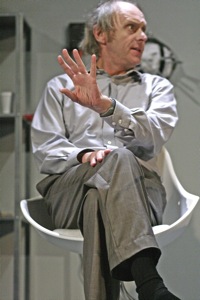Theater
Stunted lives, broken psyches
Published Thursday, 18-Feb-2010 in issue 1156
‘The Man Who’
When you break an arm, the fix is easy. But what’s the fix for a broken brain?
New Village Arts Theatre moves out of conventional play territory and into something closer to performance art in Peter Brook and Marie-Hélène Estienne’s The Man Who, playing through February 28 and directed by Kristianne Kurner.
Brook and Estienne have created a theater piece from professor of neurology Oliver Sacks’ book The Man Who Mistook His Wife For a Hat, a case-by-case exploration of neurological damage.
Four actors (Ron Choularton, Sandra Ellis-Troy, Manny Fernandes and Walter Murray), aided immeasurably by musician/sound effects genius Scott Paulson, present sketches of 16 neurological conditions. Aiding the presentation is a
large rear screen, used at the top of the show to project textbook-like brain diagrams and other medical informaton, and later to project doctor-patient interactions happening onstage.
A man thinks he’s through shaving, though he’s only done one side of his face. A woman expresses a longing to see the sea, though she was there three minutes earlier. A man thinks someone has put an amputated leg in his bed.
This is not a play. There is no plot, no real characterization, no backstory. It’s more like a classroom presentation for medical students: here are neurological problems, many of which apparently cannot be set right.
Kurner’s serious approach minimizes the hard-to-avoid freak show aspects of the topic. Even so, information given about each condition is so minimal that it’s difficult for the viewer to get much of a handle on the problem, leading to speculation about the point of portraying it.
By far the most easily accessible bit is Ron Choularton’s brilliant portrayal of the much-publicized Tourette’s syndrome. This patient may speak for all when he says, “There’s a link missing between the mind and the body, between the me and the it.”
Cast and director are to be commended for a fine production, and I’m sure some will be as fascinated as I was baffled and ultimately unsatisfied by The Man Who.
The Man Who plays through Sunday, Feb. 28, at New Village Arts Theatre. Shows Thursday and Friday at 8 p.m.; Saturday at 3 and 8 p.m.; Sunday at 2 p.m. For tickets, call 760-433-3245 or visit www.NewVillageArts.org.
‘A Delicate Balance’
There’s a whole houseful of stunted lives in Edward Albee’s A Delicate Balance.
Agnes (Loretta Haas) frets about losing her mind. The wealthy late-50s suburban matron has for nearly 40 years shared a house (though not, for some years, a bed) with her emotionally distant husband Tobias (O.P. Hadlock). Now, as she contemplates her declining years, she’s terrified that she may lose too many marbles to maintain the “delicate balance” of family dynamics.
Their utterly dysfunctional family includes 36-year-old daughter Julia (Michelle DeFrancesco), who in the first act announces her intent to return home, a refugee from her fourth failed marriage.
Then there’s Agnes’ live-in alcoholic younger sister Claire (Lynn Zetta McAlister), who unlike the others has no dreams, illusions or pretensions: she drinks because she enjoys it, and seems to take great perverse pleasure in annoying her sister.
Agnes and Tobias are surprised one night when best friends Edna (Elaine Litton) and Harry (Mark Zweifach) arrive uninvited. They seem agitated, almost haunted, and report that all of a sudden they felt frightened and unable to stay in their own house. They seem to expect to be taken in; Agnes moves them into Julia’s old room, and this is the basis of the friction this night.
Albee wrote A Delicate Balance in 1967, five years after he so shocked the Pulitzer committee with the vulgar language of his much better Who’s Afraid of Virginia Woolf? that the committee decided not to give a drama award that year. A Delicate Balance strikes me as a sanitized Virginia Woolf.
Played out on O.P. Hadlock’s terrific living-room set (“I want to move in,” noted another critic), A Delicate Balance gives us a sextet of emotional retards, living out their willfully stunted lives with the help of copious amounts of alcohol and denial.
Hadlock’s Tobias is as convincingly passive aggressive as Haas’ Agnes is overt about her disdain for Claire; the underlying sadness in both has apparently immobilized both of them for corrective action.
DeFrancesco’s Julia brings youth and a bit of life into the drab grayness of Agnes and Tobias’ relationship. She is just as messed up as her parents, but at least adds a different perspective.
McAlister’s caustic survivor Claire injects the honesty lacking in the other family members. And Litton and Zweifach project Edna and Harry’s needy existential angst in almost creepy ways.
Though I’d rather throw a book at these characters than spend an evening with them, OnStage gives us a credible reading of this prize-winning play.
A Delicate Balance plays through Saturday, Feb. 27, at OnStage Playhouse in Chula Vista. Shows Thursday through Saturday at 8 p.m.; Sunday at 2 p.m. For tickets, call 619-422-7787 or visit www.onstageplayhouse.org.
|
|
Copyright © 2003-2025 Uptown Publications



